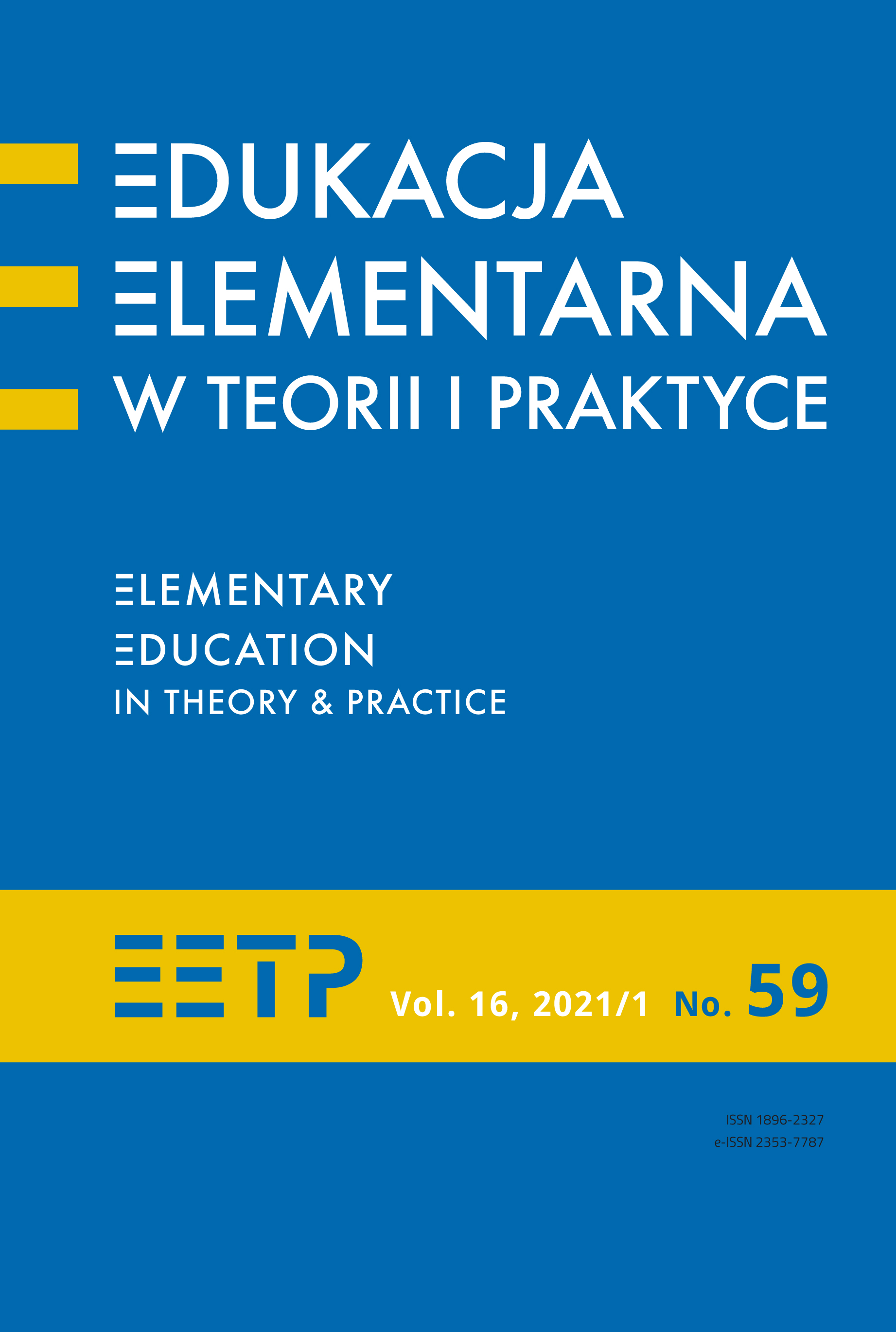Concept of the Family in the Creative Process of Children’s Interpretation of the World
Abstract
The article presents the results of the research carried out in the school year 2018/2019 in selected primary schools. The research was compliant with the assumptions of constructivism. The aim of the study was to diagnose the ways of understanding the abstract concept of a family in a group of younger schoolchildren from a large city (Lodz). It was assumed that an effective way of extracting meanings given by children is to trigger their creative activity. Typical psychodidactic techniques were used: asking questions, drafting cognitive maps and creating analogies. The material obtained in the course of observation and analysis of children’s creations has been studied. The strategy used made it possible to reconstruct the children’s process of understanding the concept of a family, and to show the possibilities inherent in the psychodidactics of creativity. Such possibilities enable teachers to activate children’s way of interpreting the world and eliciting its personal and original representations.
References
Angrosino, M.V. (2007). Doing Ethnographic and Observational Research. London: Uwe Flick.
Denzin, N.K., Lincoln, Y.S. (eds.). (2005). The Sage Handbook of Qualitative Researc,. Los Angeles: Sage Publications.
Donaldson M. (1986). Myślenie dzieci, tłum. A. Hunca-Bednarska, E. M. Hunca, Warszawa: Wiedza Powszechna.
Ferrara M., Friant N. (2015). The Application of a Multi-Methodology Approach to a Corpus of Social Representations „Qual Quant”, VI,1 – 19; DOI 10.1007/s11135-015-0203-3.
Gołębniak B. D. (2013). Edukacyjne badania w działaniu – między akademicką legitymizacją a realizacyjnymi uproszczeniami, [w:] H. Červinková, B. D. Gołębniak (red.), Edukacyjne badania w działaniu, Warszawa: Scholar, s. 51-75.
Kamiński A. (1975). Funkcje pedagogiki społecznej, Warszawa: PWN.
Kawula J,. Brągiel A., Janke W. (1997). Pedagogika rodziny. Obszary i panorama problematyki, Toruń: Wyd. Adam Marszałek.
Klus-Stańska D. (2010). Dydaktyka wobec chaosu pojęć i zdarzeń, Warszawa: Wydawnictwo Akademickie „Żak”.
Kotlarska-Michalska A. (2015). Obrazy życia rodzinnego z perspektywy półwiecza badań nad rodziną polską, [w:] I. Taranowicz, S. Grotowska (red.), Rodzina wobec wyzwań współczesności. Wybrane problemy, Wrocław: Oficyna Wydawnicza Arboretum, s. 27-56.
Nęcka E. (2005). Psychologia twórczości, Sopot: GWP.
Okoń W. (2001). Nowy słownik pedagogiczny, Warszawa: Wydawnictwo Akademickie „Żak”.
Reason P., Bradbury H. (eds.). (2008). The Sage Handbook of Action Research. Participative Inquiry and Practice, Los Angeles: Sage Publications.
Rembowski J. (1972). Więzi uczuciowe w rodzinie, Warszawa: PWN.
Rubacha K. (2008). Metodologia badań nad edukacją, Warszawa: Wydawnictwo Akademickie i Profesjonalne.
Schaffer H.R. (2006). Rozwój społeczny, tłum. M. Białecka-Pikul, K. Sikora, Kraków: Wydawnictwo UJ.
Szmidt K. (2005). Pedagogika twórczości, Sopot: GWP.
Tatarkiewicz W. (1975). Dzieje sześciu pojęć, Warszawa: PWN.
Tunnicliffe S.D. & Reiss M.J. (1999). Building a model of the environment: How do children see animals? „Journal of Biological Education” nr 33.
Urbaniak-Zając, D., Piekarski J. (red.). (2001). Jakościowe orientacje w badaniach pedagogicznych. Studia i materiały. Łódź: Wydawnictwo UŁ.
Ziemska M. (1979). Rodzina a osobowość, Warszawa: Wiedza Powszechna.
Weizenbaum J. (2008). Moglibyśmy mieć raj, Forum, wyd. z 28 stycznia.
Wrzesień W. (2003). Jednostka – rodzina – pokolenie. Studium relacji międzypokoleniowych w rodzinie, Poznań: Wydawnictwo UAM.
Słownik Języka Polskiego, https://sjp.pwn.pl/sjp/rodzina;2515555.html (data dostępu: 03.10. 2020).
Copyright (c) 2021 Elementary Education in Theory and Practice

This work is licensed under a Creative Commons Attribution-NoDerivatives 4.0 International License.
- When submitting a text, the author declares that he/she is the Author of the article (hereinafter referred to as the “Work”) and:
- he/she owns the exclusive and unlimited copyright to the Work,
- is entitled to dispose of the copyright to the Work.
Declares that it does not infringe any third party copyrights or legal rights.
Declares that there is no conflict of interest.
2. At the same time, the Author grants the Ignatianum University in Cracowa royalty-free, non-exclusive and territorially unlimited licence to use the Work in the following fields of exploitation:
- recording the Work in a hard copy, as well as on a digital or magnetic medium;
- reproduction of the Work using any technique, without limitation of the number of editions or copies;
- distribution of the Work and its copies on any medium, including marketing, sale, lending, and rental;
- introduction of the Work into a computer memory;
- disseminating the Work in information networks, including in the Internet;
- public performance, exhibition, display, reproduction, broadcasting and re-broadcasting, as well as making the Work available to the public in such a way that everyone can have access to it at a time and place of their own choosing;
- within the scope of dependent rights to the Work, including in particular the right to make necessary changes to the Work resulting from editorial and methodical development, as well as to translate the Work into foreign languages;
The licence is granted from the moment of the transfer of the Work to the Ignatianum University in Cracow. The Ignatianum University in Cracow is entitled to grant further sub-licences to the Work within the scope of the right granted. The licence is time-limited and it is granted for a period of 15 years, starting from the date of its granting.
Authors are permitted and encouraged to publish their text online (e.g. in their institution’s repository or on the institution’s website) before or during the submission process as this may lead to beneficial exchanges, as well as earlier and greater citation of the published text (See The Effect of Open Access). We recommend using any of the following portals of research associations:
- ResearchGate
- SSRN
- Academia.edu
- Selected Works
- Academic Search




